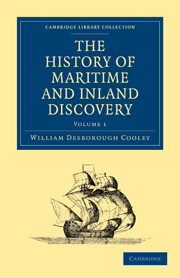Book contents
- Frontmatter
- Contents
- BOOK I GEOGRAPHY OF THE ANCIENTS
- CHAP. I
- CHAP. II THE GREEKS. — HOMERIC AGE
- CHAP. III GREEKS CONTINUED.—HISTORIC AGE
- CHAP. IV THE GREEKS CONTINUED
- CHAP. V GREEKS CONTINUED
- CHAP. VI THE GREEKS CONTINUED
- CHAP. VII DISCOVERY OF THE MONSOONS
- CHAP. VIII PTOLEMY
- CHAP. IX ON THE COMMERCE OP THE ANCIENTS
- CHAP. X MYTHIC GEOGRAPHY OP THE HINDOOS, AND ITS CONNECTION WITH GRECIAN MYTHS
- BOOK II GEOGRAPHY OF THE MIDDLE AGES
- BOOK III PROGRESS OF GEOGRAPHY IN THE MIDDLE AGES
CHAP. IX - ON THE COMMERCE OP THE ANCIENTS
Published online by Cambridge University Press: 05 July 2011
- Frontmatter
- Contents
- BOOK I GEOGRAPHY OF THE ANCIENTS
- CHAP. I
- CHAP. II THE GREEKS. — HOMERIC AGE
- CHAP. III GREEKS CONTINUED.—HISTORIC AGE
- CHAP. IV THE GREEKS CONTINUED
- CHAP. V GREEKS CONTINUED
- CHAP. VI THE GREEKS CONTINUED
- CHAP. VII DISCOVERY OF THE MONSOONS
- CHAP. VIII PTOLEMY
- CHAP. IX ON THE COMMERCE OP THE ANCIENTS
- CHAP. X MYTHIC GEOGRAPHY OP THE HINDOOS, AND ITS CONNECTION WITH GRECIAN MYTHS
- BOOK II GEOGRAPHY OF THE MIDDLE AGES
- BOOK III PROGRESS OF GEOGRAPHY IN THE MIDDLE AGES
Summary
The history of commerce is intimately connected with that of geography; for the wants and desires of mankind, which require the agency of the merchant, are the most uniform and efficient incentives to the correspondence of nations. The traffic carried on between distant countries in early times, the commodities of use or luxury imported or sent abroad, are often much more easily detected than the extent of geographical knowledge possessed by either of the parties. In a scientific age the acquaintance with the earth 's surface possesses an interest independent of its practical advantages; but in the early stages of society the different regions of the globe attracted attention chiefly as they promised to yield a quick harvest of wealth and treasure. The most important commerce in ancient times was that carried on with India; and it is that also which has been most frequently mentioned in the course of the preceding pages. If all the authentic circumstances of that great trade be minutely traced backward, they will be found rich in results calculated to elucidate the progress of discovery in the East, and may lend even some light to assisteus in investigating the more dubious intercourse of western nations.
Pliny informs us, that in his time the navigation to India was only in its infancy; and a comparison of all the accounts remaining to us respecting the commerce of the ancients with the East leads to the conclusion, that before the discovery of the monsoons by Hippalus the direct trade with India was wholly in the hands of the Arabians.
- Type
- Chapter
- Information
- The History of Maritime and Inland Discovery , pp. 123 - 138Publisher: Cambridge University PressPrint publication year: 2010First published in: 1830



